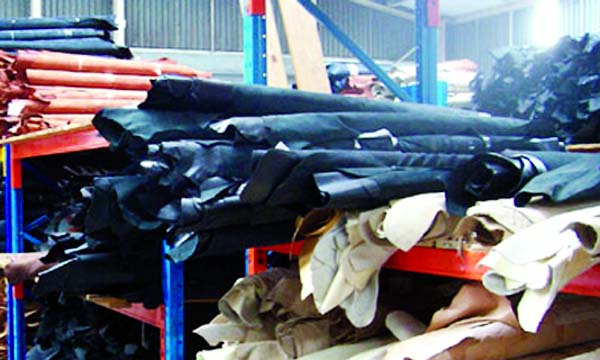
Abu sazzad :
The export earning from leather sector declined by 2.78 per cent in the first two months (July – August) of the current fiscal 2015-16 compared with corresponding period of the last fiscal 2014-15.
The said sector earned $ 196.63 million in the first two months of the current fiscal compared with $ 202.26 million compared with last fiscal’s first two months, according the latest data of EPB released on Tuesday.
The EPB data shows that leather earned $46.76 million, followed by $52.32 million from leather products and $97.55 million from leather footwear.
The government has set the export target at $1212.81 million for the leather sector in the ongoing fiscal. Country’s export earning was $1130.51 million in the last fiscal from the leather sector.
Engineer M Abu Taher, Chairman of Bangladesh Finished Leather, Leather goods, and Footwear Exporters Association told the New Nation, the production of leather-made items has been increasing in the country. The sector has the potential for becoming the second largest foreign currency earner after readymade garments.
Country’s leather industry is facing a number of problems. The tanneries at Hazaribagh in the capital have not been fully shifted to Savar. The transfer cost of the industry in the EPZ area will be approximately Tk 5,500 crore, but the government has sanctioned only Tk250 crore, said Abu Taher.
He demanded easy bank loan to make it a vibrant leather sector which will definitely facilitate the export earning for the betterment of economy. Currently, the banks are disbursing loan to the entrepreneurs at the rate of 10 per cent which is very high against the demand. He urged the central bank to soften bank loan at the rate of three per cent.
The sector may achieve the target by the end of the current fiscal year although it missed the target in the last two years, said Saiful Islam, President of the Leathergoods and Footwear Manufacturers and Exporters Association of Bangladesh.
Local leather goods manufacturers see bright prospects because of a policy-change in China. That country shows a drop in leather footwear production recently. The EU, USA and Japan are becoming worried over future supply from China.
Already, the western importers are desperately looking for new sourcing destinations and Bangladesh is in the spotlight now. Bangladesh exports leather products mainly to Italy, New Zealand, Poland, the UK, Belgium, France, Germany, the US, Canada and Spain. Besides, Japan, India, Nepal, Australia and some other countries are emerging as potential importers of Bangladeshi leather goods. Bangladesh now occupies only 0.5 per cent share in the global leather. So, huge opportunity is waiting for us, he explained.
Actually, in the international arena, Bangladesh does not have the membership of the International Footwear Conference. Bangladesh needs to become a member of this association like other competitors in global leather industry including China and India, he also said.
Saiful Islam urged the government to draft adequate policy and sanction financial support to the leather sector.
The export earning from leather sector declined by 2.78 per cent in the first two months (July – August) of the current fiscal 2015-16 compared with corresponding period of the last fiscal 2014-15.
The said sector earned $ 196.63 million in the first two months of the current fiscal compared with $ 202.26 million compared with last fiscal’s first two months, according the latest data of EPB released on Tuesday.
The EPB data shows that leather earned $46.76 million, followed by $52.32 million from leather products and $97.55 million from leather footwear.
The government has set the export target at $1212.81 million for the leather sector in the ongoing fiscal. Country’s export earning was $1130.51 million in the last fiscal from the leather sector.
Engineer M Abu Taher, Chairman of Bangladesh Finished Leather, Leather goods, and Footwear Exporters Association told the New Nation, the production of leather-made items has been increasing in the country. The sector has the potential for becoming the second largest foreign currency earner after readymade garments.
Country’s leather industry is facing a number of problems. The tanneries at Hazaribagh in the capital have not been fully shifted to Savar. The transfer cost of the industry in the EPZ area will be approximately Tk 5,500 crore, but the government has sanctioned only Tk250 crore, said Abu Taher.
He demanded easy bank loan to make it a vibrant leather sector which will definitely facilitate the export earning for the betterment of economy. Currently, the banks are disbursing loan to the entrepreneurs at the rate of 10 per cent which is very high against the demand. He urged the central bank to soften bank loan at the rate of three per cent.
The sector may achieve the target by the end of the current fiscal year although it missed the target in the last two years, said Saiful Islam, President of the Leathergoods and Footwear Manufacturers and Exporters Association of Bangladesh.
Local leather goods manufacturers see bright prospects because of a policy-change in China. That country shows a drop in leather footwear production recently. The EU, USA and Japan are becoming worried over future supply from China.
Already, the western importers are desperately looking for new sourcing destinations and Bangladesh is in the spotlight now. Bangladesh exports leather products mainly to Italy, New Zealand, Poland, the UK, Belgium, France, Germany, the US, Canada and Spain. Besides, Japan, India, Nepal, Australia and some other countries are emerging as potential importers of Bangladeshi leather goods. Bangladesh now occupies only 0.5 per cent share in the global leather. So, huge opportunity is waiting for us, he explained.
Actually, in the international arena, Bangladesh does not have the membership of the International Footwear Conference. Bangladesh needs to become a member of this association like other competitors in global leather industry including China and India, he also said.
Saiful Islam urged the government to draft adequate policy and sanction financial support to the leather sector.

